Coordinación
Una coordinación sólida puede evitar vacíos y duplicaciones en las respuestas humanitarias, así como garantizar que los PTM complementen otros tipos de asistencia. Sin embargo, el informe del «Estado Global de los Programas de Transferencias Monetarias» de la CALP Network muestra que la coordinación de la asistencia en efectivo es vista como débil y ad hoc, y que esto está teniendo graves repercusiones operativas.
Los donantes, las ONG y los líderes de los grupos de trabajo de transferencias monetarias (GTM) han pedido claridad sobre tres temas principales relacionados con la coordinación de la asistencia en efectivo:
- Quién debe ser responsable de asegurar una coordinación eficaz de la asistencia en efectivo;
- Cuál es la función y el mandato de los grupos de trabajo de transferencias monetarias, incluso en relación con las transferencias monetarias multipropósito;
- Cómo se debe dotar de recursos a la coordinación de asistencia en efectivo.
Tenemos que basarnos urgentemente en lo que funciona y proporcionar claridad a nivel mundial sobre las preguntas arriba mencionadas, adaptándonos a los diferentes contextos. Hace mucho tiempo que se deberían haber tomado decisiones claras basadas en necesidades operativas y no en la política de las agencias.
Prioridades actuales
El objetivo de la CALP Network es contribuir a seguir progresando en este tema en tres niveles: apoyar a los grupos de trabajo de transferencias monetarias a nivel regional; contribuir a soluciones prácticas para la coordinación de la asistencia en efectivo a nivel mundial; y convocar una discusión basada en la evidencia sobre temas clave, destacando puntos de decisión críticos y oportunidades de progreso.
Contenido destacado

Cash Coordination Tip Sheet
Guidelines and Tools
This tip sheet sets out established best practice, key guidance and resources for all aspects of cash coordination, intended as a clear, accessible and action-oriented guide for those engaged in coordination of cash and voucher assistance (CVA) at the field level.

Introducing the Cash Coordination Tip Sheet
Webinar
The CALP Network has developed a tipsheet setting out established best practice and key guidance and resources for all aspects of cash coordination, intended as a clear, accessible and action-oriented guide for those engaged in coordination of cash and voucher assistance at the field level.

Cash Coordination: A proposal from members in MENA
Blog Post
Earlier this year the CALP Network undertook regional consultations to explore options for cash coordination. This blog lays out recommendations from participants from the Middle East and North Africa who sketched out what cash coordination, and coordination more broadly, could look like in future to support a more effective, efficient and accountable response.
Últimos recursos

Webinar: Asia-Pacific Regional CWG & the CALP Network Webinar on Beneficiary Data Protection in Asia
Event
On March 7, 2019 the CALP Network and the Asia-Pacific Regional Cash Working Group hosted a webinar on beneficiary data protection in Asia. Panelists from within Asia shared experiences on steps they've taken to practice responsible data management and ways you could get started at your own organization.

Key Donors Publish ‘Common Donor Approach to Humanitarian Cash Programming’ – Read the statement in full here
News
Donors from Australia, Canada, Denmark, EU/DG ECHO, Germany, Norway, Sweden, Switzerland, UK and USA set out a shared vision and principles which will guide their support for cash programming, a significant step towards stronger donor coordination.

The UN Common Cash Platform: What does it mean and how is the IRC responding?
Blog Post
Together our members and partners have strengthened the evidence base and advanced the debate around gender and cash and voucher assistance. Looking ahead, how can we ensure we turn talk into action to deliver quality CVA for everyone?

Mitigating Risks of Abuse of Power in Cash Assistance in Rwanda
Report
This document outlines lessons learned from a joint UNHCR-WFP project in Rwanda aimed at identifying and mitigating the risks of imbalance of power in cash assistance. The cash transfer mechanism reviewed during the project was a bank card, proposed to the overwhelming majority of refugees receiving cash...

Guía para la salvaguarda de la niñez en los Programas de Transferencias Monetarias
Guía y herramientas
El propósito de esta guía es determinar los posibles riesgos en materia de salvaguarda de la niñez asociados con los programas de transferencias monetarias y ofrecer ciertas sugerencias durante la gestión dichos programas, (haciendo hincapié en los métodos de seguimiento y mitigación) con el fin de...

Compte-rendu du Cash Working Group du Niger du 06 mars 2019
Report

Cash and Crises Series Episode I: Digital Money
Video
Cash and Crises is a series of financial literacy audiographics brought to you by CashEssentials, a private sector initiative with a social mission to support the relief and development community in understanding how cash is managed for society in times of crisis. In Episode 1, we start with a short...

Cash Enthusiast’s Guide to Humanitarian Networks and Partnerships Week
Blog Post
The fifth Humanitarian Networks and Partnerships Week (HNPW) will be held at the International Conference Centre (CICG) in Geneva, Switzerland from 4-8 February 2019.
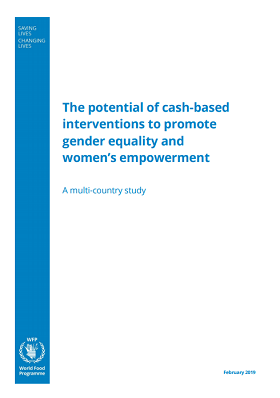
The Potential of Cash-Based Interventions to Promote Gender Equality and Women’s Empowerment
Report
The study on The Potential of Cash-Based Interventions to Promote Gender Equality and Women’s Empowerment sought to explore how CBIs can contribute to achieving gender equality and women’s empowerment (GEWE), as ends in themselves and for food security and nutrition outcomes. Where changes in GEWE...
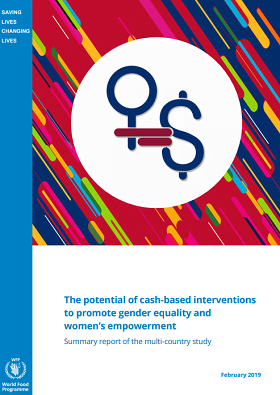
The Potential of Cash-Based Interventions to Promote Gender Equality and Women’s Empowerment – Summary Report of the Multi-Country Study
Report
The study on The Potential of Cash-Based Interventions to Promote Gender Equality and Women’s Empowerment sought to explore how CBIs can contribute to achieving gender equality and women’s empowerment (GEWE), as ends in themselves and for food security and nutrition outcomes. Where changes in GEWE...
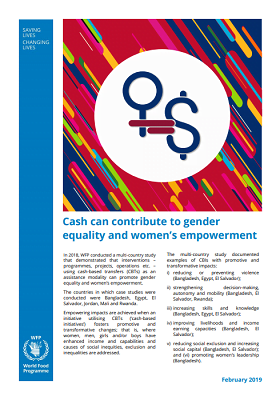
Cash Can Contribute to Gender Equality and Women’s Empowerment
Report
In 2018, WFP conducted a multi-country study that demonstrated that interventions – programmes, projects, operations etc. – using cash-based transfers (CBTs) as an assistance modality can promote gender equality and women’s empowerment. The countries in which case studies were conducted were...
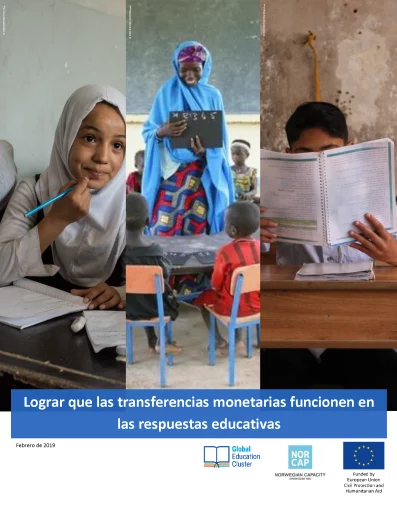
Lograr que las transferencias monetarias funcionen en las respuestas educativas
Informe
Aunque el conocimiento sobre las prácticas generales en el ámbito de las transferencias monetarias ha aumentado, todavía existen lagunas significativas en cuanto al uso de estas transferencias en favor de la educación en situaciones de emergencia. Además, las transferencias monetarias suelen estar en...

Networks and Collective Action : Hard-truths and top tips
Blog Post
In this guest blog, independent humanitarian consultant and former programme coordinator for the CALP Network, Isabelle Pelly, shares her advice for leveraging the power of networks for collective action.
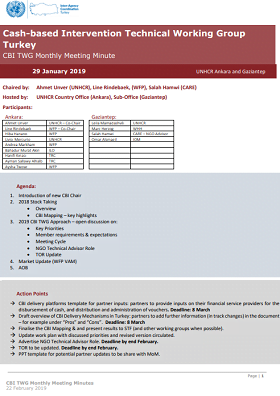
CBI TWG Meeting Minutes 29-01-19
Report
CBI TWG Meeting Minutes 29-01-19
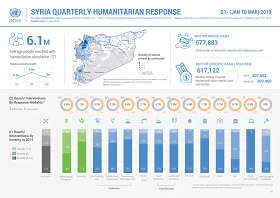
Syria Quarterly Humanitarian Response (Q1 January to March 2019)
Report
Summary of the humanitarian aid delivered to beneficiaries in Syria during Q1 2019

Analysis of social and power dynamics of stakeholders for the implementation of multi-year MultiPurpose Cash Transfers in North Mali
Report
Six INGOs (Hunger Against Action, Danish Refugee Council, Handicap International, Oxfam, Solidarités International and International Rescue Committee) have been implementing a MultiPurpose Cash Transfers programme in Mali; the second phase of this social safety net intervention targets the communes the...

Reflections and recommendations from evaluations of the 2017 CVA Somalia Drought Response
Report
Improving our response to drought to avert crises through the use of cash and voucher assistance requires us to build on experience. This paper pulls together reflections and recommendations from a review of eight evaluation reports, reviews and studies that were conducted during or after the 2017 drought...
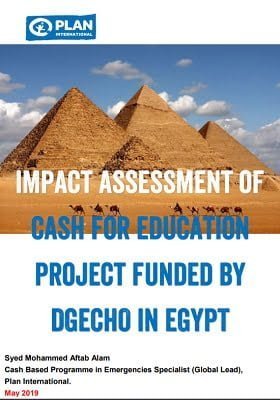
Impact Assessment for Cash for Education Project funded by DGECHO in Egypt
Report
The overall objectives of the Impact assessment were: To measure the impact of cash on the girls and boys by DGECHO funded project. To measure the impact of cash on Education and protection through a gender lens to investigate considerations of power dynamics in the households Understand the good...

Harmonising registrations and identification in emergencies in Somalia
Report
The study reveals that the collection of registration and identification data in Somalia is governed mainly by policies, guidelines and standard operating procedures developed by humanitarian agencies. Before collecting registration data, most humanitarian agencies select recipients through a two-step...

Compte-rendu du Cash Working Group de Maroua du 25 janvier 2019
Report